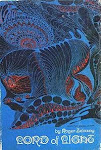
They'd Rather Be Right, by Mark Clifton and Frank Riley, was published in 1954 and was the 2nd Hugo Award winner. It's set in a near-future of 1950s San Francisco, but doesn't specify the exact date. According to its Wikipedia entry, this book is "widely labeled as the worst novel to ever win a Hugo"--I haven't read enough of the Hugo winners yet to have an educated opinion on that statement, so I'll have to judge the book on its own merits.
If, like the University of Princeton, you define science fiction as "literary fantasy involving the imagined impact of science on society," this book is science fiction. As far as I'm concerned, this book barely qualifies for inclusion in the genre. The book includes only one piece of technology that would have been non-standard in the 50s, and a few telepaths, and while they're integral to the story they're certainly not critical to the novel's main messages.
The book's central message is that humans must evolve and change to meet environmental challenges to survive as a species. Unfortunately, it's the means of change chosen by the authors that probably cause people to scorn the book.
I wasn't around in the 50s, so I can't be sure, but I'd guess based on the authors' treatment of the "sciences" involved that psychosomatic therapy was considered to be a promising and cutting-edge concept at the time. These days, it's lumped in with a host of other holistic and non-traditional techniques that are scorned by the mainstream medical community. In this novel, a multi-disciplined group of scientists work together to create a new breed of thinking machine and program it exclusively with the proven scientific facts of the day; amongst these facts are the techniques of psychosomatic therapy. It becomes apparent to the scientists that using the machine to administer the therapy can remove the lifetime's accumulation of tension from the patient's cells and cause him to become young again. As part of the therapy, the patient must let go of any and all preconceived notions that conflict with the machine's knowledge base (they're the source of the cellular tension, apparently); once you've completed the therapy, you're so literally open-minded that you become telepathic. Impressive house of cards to build on a base of holistic medicine--but that's what science fiction as a genre is all about, I suppose.
The authors do present some interesting ideas, if you can get past the pseudo-science to find them. Unfortunately, any of the ideas that could have been considered original in 1954 have been borrowed and rehashed so many times, by more adept authors, that they don't qualify the book as a "must read". The book's title is a clever reference to the double-edged nature of its thinking machine, but it's not sufficient payoff for the layers of pseudo-science you have to wade through to get there.
My conclusion: 1954 must have been a very lean year for science fiction, or the sci-fi community must have bought into the concept of psychosomatic therapy. Unless you're embarking on a project like mine and want to read this book as part of a larger set, I'd suggest that you not expend too much effort tracking it down. On the other hand, it's a quick read and has some thought-provoking concepts buried in it. I don't regret the time I spent reading it, but won't be looking for other titles by the authors. Rating: 3/5

